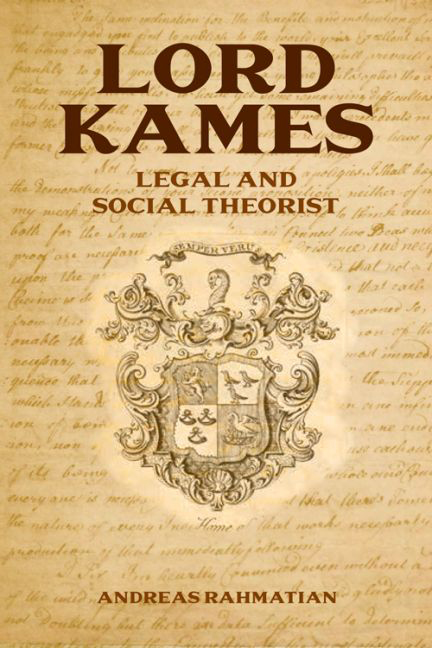Book contents
- Frontmatter
- Contents
- Preface
- Bibliography of Works by Lord Kames and Abbreviated References
- I Introduction
- II Aesthetics
- III Moral Philosophy I: Principles
- IV Moral Philosophy II: Development
- V Political Philosophy, Anthropology and Commerce
- VI Legal History, Legal Science and Comparative Law
- VII Property
- VIII Equity
- IX Obligations and Enforcement
- X Criminal Law
- XI Lord Kames's Influence on Some of the Founders of the United States
- XII A Critical Conclusion
- Bibliography
- Index
VI - Legal History, Legal Science and Comparative Law
Published online by Cambridge University Press: 12 September 2017
- Frontmatter
- Contents
- Preface
- Bibliography of Works by Lord Kames and Abbreviated References
- I Introduction
- II Aesthetics
- III Moral Philosophy I: Principles
- IV Moral Philosophy II: Development
- V Political Philosophy, Anthropology and Commerce
- VI Legal History, Legal Science and Comparative Law
- VII Property
- VIII Equity
- IX Obligations and Enforcement
- X Criminal Law
- XI Lord Kames's Influence on Some of the Founders of the United States
- XII A Critical Conclusion
- Bibliography
- Index
Summary
Kames's Legal History and Conjectural or Philosophical History
Before one can embark on a discussion of the more technical legal sections in Kames's oeuvre, it is necessary to explain the underlying philosophy of history which underpins most of Kames's writings on law. For the ahistorical mind of the modern black-letter lawyer this may be astonishing, but for Kames the present law is inevitably the result of a historical process and of an anthropological development; it is also the outcome, if not a branch, of applied moral philosophy and formal philosophical reasoning. Otherwise it cannot be understood and lacks the quality of a ‘science’, a status Kames always wanted law to elevate to. If law is studied divorced from its historical and philosophical context, it degenerates into a dry set of meaningless and unsystematic rules, adhered to on the basis of authority only, and not developed by the exercise of reason:
The history of mankind is a delightful subject. A rational enquirer is not less entertained than instructed, when he traces the gradual progress of manners, of laws, of arts, from their birth to their perfect maturity…. Law in particular becomes then only a rational study, when it is traced historically, from its first rudiments among savages, through successive changes, to its highest improvements in a civilized society…. Law, like geography, is taught as if it were a collection of facts merely: the memory is employed to the full, rarely the judgment…. Such neglect of the history of law is the more unaccountable, that in place of a dry, intricate and crabbed science, law treated historically becomes an entertaining study …
What are our law-books but a mass of naked propositions, drawn chiefly from the decisions of our supreme courts, rarely connected either with premises or consequences? … [The professors of Roman law] load the weak mind with a heap of uninteresting facts, without giving any exercise to the judgment. Is it surprising, that the Roman law, so taught, is held to be a dry and fatiguing study? … Were law taught as a rational science, its principles unfolded, and its connection with manners and politics, it would prove an enticing study …
- Type
- Chapter
- Information
- Lord KamesLegal and Social Theorist, pp. 191 - 219Publisher: Edinburgh University PressPrint publication year: 2015

